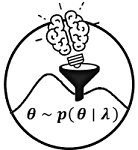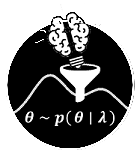elicit.utils module#
- elicit.utils.save_as_pkl(obj: Any, save_dir: str) None[source]#
Helper functions to save a file as pickle.
- Parameters:
- objany
variable that needs to be saved.
- save_dirstr
path indicating the file location.
- Returns:
- None.
Examples
>>> save_as_pkl(obj, "results/file.pkl")
- elicit.utils.identity(x: float) Any[source]#
identity function. Returns the input
- Parameters:
- xany
arbitrary input object.
- Returns:
- xany
returns the input object without any transformation.
- class elicit.utils.DoubleBound(lower: float, upper: float)[source]#
Bases:
objectA variable constrained to be in the open interval (
lower,upper) is transformed to an unconstrained variable Y via a scaled and translated log-odds transform.Basis for the here used constraints, is the constraint transforms implementation in Stan.
- Parameters:
- lowerfloat
lower bound of variable x.
- upperfloat
upper bound of variable x.
- __init__(lower: float, upper: float)[source]#
A variable constrained to be in the open interval (
lower,upper) is transformed to an unconstrained variable Y via a scaled and translated log-odds transform.Basis for the here used constraints, is the constraint transforms implementation in Stan.
- Parameters:
- lowerfloat
lower bound of variable x.
- upperfloat
upper bound of variable x.
- logit(u: float) float[source]#
Helper function that implements the logit transformation for \(u \in (0,1)\):
\[logit(u) = \log\left(\frac{u}{1-u}\right)\]- Parameters:
- ufloat
variable in open unit interval.
- Returns:
- vfloat
log-odds of u.
- inv_logit(v: float) float[source]#
Helper function that implements the inverse-logit transformation (i.e., the logistic sigmoid for \(v \in (-\infty,+\infty)\):
\[logit^{-1}(v) = \frac{1}{1+\exp(-v)}\]- Parameters:
- vfloat
unconstrained variable
- Returns:
- ufloat
logistic sigmoid of the unconstrained variable
- forward(x: float) float[source]#
scaled and translated logit transform of variable x with
lowerandupperbound into an unconstrained variable y.\[Y = logit\left(\frac{X - lower}{upper - lower}\right)\]- Parameters:
- xfloat
variable with lower and upper bound.
- Returns:
- yfloat
unconstrained variable.
- inverse(y: float) float[source]#
inverse of the log-odds transform applied to the unconstrained variable y in order to transform it into a constrained variable x with
lowerandupperbound.\[X = lower + (upper - lower) \cdot logit^{-1}(Y)\]- Parameters:
- yfloat
unconstrained variable
- Returns:
- xfloat
- constrained variable with lower and upper bound
- class elicit.utils.LowerBound(lower: float)[source]#
Bases:
objectA variable with a
lowerbound is transformed to an unconstrained variable Y via an inverse-softplus transform.Basis for the here used constraints, is the constraint transforms implementation in Stan.
- Parameters:
- lowerfloat
lower bound of variable X.
- __init__(lower: float)[source]#
A variable with a
lowerbound is transformed to an unconstrained variable Y via an inverse-softplus transform.Basis for the here used constraints, is the constraint transforms implementation in Stan.
- Parameters:
- lowerfloat
lower bound of variable X.
- class elicit.utils.UpperBound(upper: float)[source]#
Bases:
objectA variable with an
upperbound is transformed into an unconstrained variable Y via an inverse-softplus transform.Basis for the here used constraints, is the constraint transforms implementation in Stan.
- Parameters:
- upperfloat
upper bound of variable X.
- __init__(upper: float)[source]#
A variable with an
upperbound is transformed into an unconstrained variable Y via an inverse-softplus transform.Basis for the here used constraints, is the constraint transforms implementation in Stan.
- Parameters:
- upperfloat
upper bound of variable X.
- elicit.utils.one_forward_simulation(prior_model: Priors, model: Dict[str, Any], targets: List[Target], seed: int) Tuple[dict, Tensor, dict, dict][source]#
One forward simulation from prior samples to elicited statistics.
- Parameters:
- prior_modelinstance of Priors class objects
initialized prior distributions which can be used for sampling.
- modeldict
specification of generative model using
elicit.elicit.model().- targetslist
list of target quantities specified with
elicit.elicit.target().- seed: int
random seed.
- Returns:
- elicited_statisticsdict
dictionary containing the elicited statistics that can be used to compute the loss components
- prior_samplestf.Tensor
samples from prior distributions
- model_simulationsdict
samples from the generative model (likelihood) given the prior samples for the model parameters
- target_quantitiesdict
target quantities as a function of the model simulations.
- elicit.utils.get_expert_data(trainer: Trainer, model: Dict[str, Any], targets: List[Target], expert: ExpertDict, parameters: List[Parameter], network: NFDict | None, seed: int) Tuple[Dict[str, Tensor], Tensor | None][source]#
Wrapper for loading the training data which can be expert data or data simulations using a pre-defined ground truth.
- Parameters:
- trainerdict
specification of training settings and meta-information for workflow using
trainer()- modeldict
specification of generative model using
elicit.elicit.model().- targetslist
list of target quantities specified with
elicit.elicit.target().- expertdict
provide input data from expert or simulate data from oracle with either the
dataorsimulatormethod of theelicit.elicit.Expertmodule.- parameterslist
list of model parameters specified with
elicit.elicit.parameter().- networkdict, optional
specification of neural network using a method implemented in
elicit.networks. Only required fordeep_priormethod. Forparametric_prioruseNone.- seedint
internal seed for reproducible results
- Returns:
- expert_datadict
dictionary containing the training data. Must have same form as the model-simulated elicited statistics. Correct specification of keys can be checked using
elicit.utils.get_expert_datformat()- expert_priortf.Tensor, shape: [B,num_samples,num_params] or None
samples from ground truth. Exists only if expert data are simulated from an oracle. Otherwise this output is
None
- elicit.utils.save(eliobj, name: str | None = None, file: str | None = None, overwrite: bool = False) None[source]#
saves the eliobj as pickle.
- Parameters:
- eliobj: callable
instance of the
elicit.elicit.Elicit()class.- name: str, optional
name of the saved .pkl file. File is saved as .results/{method}/{name}_{seed}.pkl
- file: str, optional
path to file, including file name, e.g. file=”res” (saved as res.pkl) or file=”method1/res” (saved as method1/res.pkl)
- overwrite: bool
whether to overwrite existing file. Default value is False.
- elicit.utils.load(file: str) Callable[source]#
loads a saved
eliobjfrom specified path.- Parameters:
- filestr
path where
eliobjobject is saved.
- Returns:
- eliobjel.elicit.Elicit obj
loaded
eliobjobject.
- elicit.utils.parallel(runs: int = 4, cores: int | None = None, seeds: list | None = None) Parallel[source]#
Specification for parallelizing training by running multiple training instances with different seeds simultaneously.
- Parameters:
- runs: int
Number of replication. The default is
4.- coresint, optional
Number of cores that should be used. The default is
Nonewhich impliescores=runs.- seedslist, optional
A list of seeds. If
Noneseeds are drawn from a Uniform(0,999999) distribution. The seed information corresponding to each chain is stored ineliobj.results.
- Returns:
- parallel_dictdict
dictionary containing the parallelization settings.
- elicit.utils.save_history(loss: bool = True, loss_component: bool = True, time: bool = True, hyperparameter: bool = True, hyperparameter_gradient: bool = True) SaveHist[source]#
Controls whether sub-results of the history object should be included or excluded. Results are saved across epochs. By default all sub-results are included.
- Parameters:
- lossbool
total loss per epoch. The default is
True.- loss_componentbool
loss per loss-component per epoch. The default is
True.- timebool
time in sec per epoch. The default is
True.- hyperparameterbool
‘parametric_prior’ method: Trainable hyperparameters of parametric prior distributions. ‘deep_prior’ method: Mean and standard deviation of each marginal from the joint prior. The default is
True.- hyperparameter_gradientbool
Gradients of the hyperparameter. Only for ‘parametric_prior’ method. The default is
True.
- Returns:
- save_hist_dictdict
dictionary with inclusion/exclusion settings for each sub-result in history object.
Warning
if
loss_componentorlossare excluded,elicit.plots.loss()can’t be used as it requires this information.if
hyperparameteris excluded,elicit.plots.hyperparameter()can’t be used as it requires this information. Only parametric_prior method.if
hyperparameteris excluded,elicit.plots.marginals()can’t be used as it requires this information. Only deep_prior method.
- elicit.utils.save_results(target_quantities: bool = True, elicited_statistics: bool = True, prior_samples: bool = True, model_samples: bool = True, expert_elicited_statistics: bool = True, expert_prior_samples: bool = True, init_loss_list: bool = True, init_prior: bool = True, init_matrix: bool = True, loss_tensor_expert: bool = True, loss_tensor_model: bool = True) SaveResults[source]#
Controls whether sub-results of the result object should be included or excluded in the final result file. Results are based on the computation of the last epoch. By default all sub-results are included.
- Parameters:
- target_quantitiesbool
simulation-based target quantities. The default is
True.- elicited_statisticsbool
simulation-based elicited statistics. The default is
True.- prior_samplesbool
samples from simulation-based prior distributions. The default is
True.- model_samplesbool
output variables from the simulation-based generative model. The default is
True.- expert_elicited_statisticsbool
expert-elicited statistics. The default is
True.- expert_prior_samplesbool
if oracle is used: samples from the true prior distribution, otherwise it is None. The default is
True.- init_loss_listbool
initialization phase: Losses related to the samples drawn from the initialization distribution. Only included for method ‘parametric_prior’. The default is
True.- init_priorbool
initialized elicit model object including the trainable variables. Only included for method ‘parametric_prior’. The default is
True.- init_matrixbool
initialization phase: samples drawn from the initialization distribution for each hyperparameter. Only included for method ‘parametric_prior’. The default is
True.- loss_tensor_expertbool
expert term in loss component for computing the discrepancy. The default is
True.- loss_tensor_modelbool
simulation-based term in loss component for computing the discrepancy. The default is
True.
- Returns:
- save_res_dictdict
dictionary with inclusion/exclusion settings for each sub-result in results object.
Warning
if
elicited_statisticsis excludedelicit.plots.loss()can’t be used as it requires this information.if
init_matrixis excludedelicit.plots.initialization()can’t be used as it requires this information.if
prior_samplesis excludedelicit.plots.prior_joint()can’t be used as it requires this information.if
target_quantitiesis excludedelicit.plots.priorpredictive()can’t be used as it requires this information.if
expert_elicited_statisticsorelicited_statisticsis excludedelicit.plots.elicits()can’t be used as it requires this information.
- elicit.utils.clean_savings(history: dict, results: dict, save_history: SaveHist, save_results: SaveResults) Tuple[dict, dict][source]#
- Parameters:
- historydict
results that are saved across epochs including among others loss, loss_component, time, and hyperparameter. See
save_history()for complete list.- resultsdict
results that are saved for the last epoch only including prior_samples, elicited_statistics, target_quantities, etc. See
save_results()for complete list.- save_historydict,
elicit.utils.save_history() Exclude or include sub-results in the final result file. In the
historyobject are all results that are saved across epochs. For usage information see How-To: Save and load the eliobj- save_resultsdict,
elicit.utils.save_results() Exclude or include sub-results in the final result file. In the
resultsobject are all results that are saved for the last epoch only. For usage information see How-To: Save and load the eliobj
- Returns:
- results, historyTuple[dict, dict]
final results taking in consideration exclusion criteria as specified in
save_history()andsave_results().
- elicit.utils.get_expert_datformat(targets: List[Target]) Dict[str, list][source]#
helper function for the user to inspect which data format for the expert data is expected by the method.
- Parameters:
- targetslist
list of target quantities specified with
elicit.elicit.target().
- Returns:
- elicit_dictdict[str, list]
expected format of expert data.
- elicit.utils.softmax_gumbel_trick(likelihood: Callable, upper_thres: float, temp: float = 1.6, **kwargs)[source]#
The softmax-gumbel trick computes a continuous approximation of ypred from a discrete likelihood and thus allows for the computation of gradients for discrete random variables.
Currently this approach is only implemented for models without upper boundary (e.g., Poisson model).
Corresponding literature:
Maddison, C. J., Mnih, A. & Teh, Y. W. The concrete distribution: A continuous relaxation of discrete random variables in International Conference on Learning Representations (2017). https://doi.org/10.48550/arXiv.1611.00712
Jang, E., Gu, S. & Poole, B. Categorical reparameterization with gumbel-softmax in International Conference on Learning Representations (2017). https://openreview.net/forum?id=rkE3y85ee.
Joo, W., Kim, D., Shin, S. & Moon, I.-C. Generalized gumbel-softmax gradient estimator for generic discrete random variables. Preprint at https://doi.org/10.48550/arXiv.2003.01847 (2020).
- Parameters:
- likelihoodCallable, tfp.distributions object, shape = [B, num_samples, num_obs, 1]
likelihood function used in the generative model. Must be a tfp.distributions object.
- upper_thresfloat
upper threshold at which the distribution of the outcome variable is truncated. For double-bounded distribution (e.g. Binomial) this is simply the “total count” information. Lower-bounded distribution (e.g. Poisson) must be truncated to create an artificial double-boundedness.
- tempfloat, temp > 0
temperature hyperparameter of softmax function. A temperature going towards zero yields approximates a categorical distribution, while a temperature >> 0 approximates a continuous distribution. The default value is
1.6.- kwargsany
additional keyword arguments including the seed information. Note: the
**kwargsargument is required in this function (!) as it extracts internally the seed information.
- Returns:
- ypredtf.Tensor
continuously approximated ypred from the discrete likelihood.

